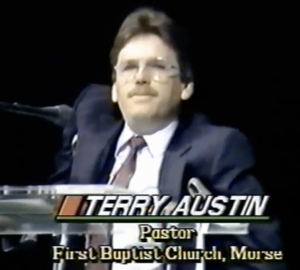Losing something that once was valued and respected is painful.
It doesn’t matter if it’s been circling the drain for years. When death finally comes, the grief is real. Such was the case for me recently with the Baptist General Convention of Texas, known as BGCT to us Texans.
The BGCT is a convention of cooperating Baptist churches in Texas. I don’t know the current numbers, but at one time, they reported more than 5,000 churches in Texas. In addition, they had affiliations with numerous colleges and universities, including Baylor, a seminary or two, hospitals around the state, several children’s homes and other entities. Texas is a big state, and the BGCT certainly fits.
My introduction began as a college student in Plainview, Texas, in 1973. Since I was studying for the ministry, the BGCT paid a sizable amount of my tuition, even though I was from Colorado. I was appreciative, and it was the beginning of a long relationship. Upon completing college and seminary in Kentucky, I returned to Texas to be the pastor of my first church, a cooperating BGCT church. It was a small church with 50 attendees on a good Sunday.

Terry Austin addressing the BGCT annual meeting
During my 13 years there, I learned much about the BGCT. Even though I was a little fish in a big pond, I never felt that way. I met several leaders from the state office in Dallas and discovered they were eager to come to our little community when asked. It took some time and several phone calls to work out the logistics, but Bill Pinson, BGCT executive director, spent a weekend with our small group of deacons to lead a retreat.
In 1990, I was invited to address the annual meeting of the BGCT in Houston. It was not a major keynote address. It was a short 10-minute speech representing small churches. It was an honor for a pastor of a small church in a forsaken corner of the state. It was made possible by two men I respected — Ed Rogers, who was pastor of the largest church in our area, and Phil Linebarger, BGCT president at that time. It was a heady moment.
Several years later, I was hired to work at the state office in Dallas as a stewardship consultant. I loved the job and the people I worked with. They all were quality people committed to serving God and the church. I worked there 10 years, leaving to accept a job offer that would allow me to cut down on travel, something much needed for my quickly deteriorating body.
“My time working for the BGCT probably was the best time of my life.”
My time working for the BGCT probably was the best time of my life. It allowed me to preach in more than 500 Baptist churches in Texas. I traveled thousands of miles across the vast state, meeting people of all races, backgrounds, lifestyles and languages. Occasionally it required translators and, on occasion, eating food that was beyond my taste. As they say, “When in Rome… .”
I was constantly amazed at how people stepped up to assist with my physical needs. Walking on crutches meant I needed assistance with stairs. There were always great folks to pick me up when needed, fill my plate at a potluck, set up a projector, fix a flat on my wheelchair, or whatever needed to be done. I loved Baptists and the BGCT for introducing me to so many of them.
Things began to unravel when the Southern Baptist Convention decided to jump on the fundamentalist bandwagon. An uneasy partnership existed between Texas Baptists and the national denomination. By sheer size, the SBC needed the BGCT. In fact, that relationship also allowed me to extend my ministry across the country. At one time, nearly every stewardship publication promoted by the SBC had my fingerprints on it.
As the SBC continued moving toward a more closed, clearly defined understanding of the Christian faith, it meant churches were held to a stricter standard. In case you’re not a Baptist, I need to explain something at this point. I was taught the only requirement for being a Southern Baptist church was making a financial contribution to their mission efforts, known as the Cooperative Program. Even though all Baptist churches agreed on the basics — Baptist distinctives, they were called — they were not required.
Despite the direction of the SBC, the BGCT remained faithful to those historical Baptist distinctives. It turned out to be costly as a couple of thousand churches formed a new state convention. However, my work continued unabated. There still were more churches needing stewardship help than I had resources to supply.
After leaving my job at the BGCT, I continued to work with churches and maintained my membership in a Baptist church. Specifically, it was Broadway Baptist Church in Fort Worth. In 2009, the SBC severed its relationship with Broadway, and then shortly, thereafter the church chose to leave the BGCT. All this was over the issue of homosexuality. It wasn’t that Broadway was performing gay weddings and ordaining gay ministers. It was over the church’s refusal to condemn homosexuality.
I remember one Sunday when the issue was all over local news reports and the sanctuary was filled to capacity. Leaving worship, I overheard two visitors talking in the foyer, and one of them said, “That was no big deal.” We were simply doing church as usual; it was no big deal.
“Suddenly, I belonged to a church that no longer was Southern Baptist or Texas Baptist.”
Suddenly, I belonged to a church that no longer was Southern Baptist or Texas Baptist.
Over the next few years, a friend I met when he had been the interim pastor at Broadway, Charlie Johnson, and I started a new church we called Bread Fellowship. It was a unique approach, and the fact that neither of us needed financial income allowed us to be flexible. At one point, the local Baptist association provided a small amount of money to allow us to rent a storefront in an up-and-coming neighborhood. During the week, we used the space for a yoga studio, art studio and other opportunities. We accepted financial help for six months. The church never identified as Southern Baptist, Texas Baptist or even Baptist.
A couple of years after I stepped away from the church, I received a phone call from a nice gentleman in Alabama who identified himself as a member of the Credentials Committee of the SBC. In their investigation, somehow, they discovered via Bread Fellowship’s website that we had a member (we didn’t even have membership, by the way) who appeared to be gay. I advised him I no longer was affiliated with the church and assured him the current leadership (Charlie was still there) had no idea they were even a member of the SBC. To make a long story short, the Credentials Committee saw to it that Bread Fellowship was not in good standing, as if anyone cared.
I have not considered myself a Baptist for a long time, although my friend Charlie sometimes calls me the only True Baptist he knows. Charlie is a great friend, but I’ve learned he likes to exaggerate.
In 2008, Charles Wade announced his retirement as executive director of the BGCT. Coincidentally, I accused Wade of upstaging me because I submitted my resignation the same day, which was not newsworthy. His absence began the path down the slippery slope of cozying up to the SBC. Up until that point, the BGCT had stood firm with the Baptist distinctive of the autonomy of the local church. In other words, outside entities have no authority over the local congregation.
Two years later, Royal Lane Church in Dallas was “disfellowshipped,” whatever that means. Six years after that, the BGCT contemplated expelling a cooperating church over the issue of homosexuality. That year, they adopted a motion declaring, “Any church which affirms any sexual relationship outside the bonds of a marriage between one man and one woman be considered out of harmonious cooperation with the Baptist General Convention of Texas.” The purge has continued, and several additional churches were excluded earlier this year.
This is not the BGCT I loved and served for many years. It has gone the way of Southern Baptists.
“It was always drilled into us that our work was to help churches, not judge them, but apparently, that is no longer their purpose.”
I perused the current employee list on the BGCT website this afternoon, and there are still a significant number of people I know working there. I’m sad for them. It was always drilled into us that our work was to help churches, not judge them, but apparently, that is no longer their purpose. I never rejected a church requesting help, and to be honest, there were a couple that were not even members of the convention. It didn’t matter. Judging was not in my purview as a BGCT employee.
That seems to have changed. It hit me as I read the latest news of church expulsions that the BGCT is dead. They have gone the way of the SBC. Two powerful entities that helped countless people find Jesus have succumbed to the damaging power inherent in the ability to define and control.
In 1990, when I was invited to address the annual meeting of the BGCT, the topic assigned was “We Are Different, But We Belong.” Three of us spoke to the issue. I represented small rural congregations, alongside a pastor of a Hispanic congregation in South Texas and a Korean pastor representing language congregations. Our differences didn’t matter because we were all about sharing the message of Jesus.
The BGCT is now about excluding those who don’t toe the line. The criterion has nothing to do with Baptist distinctives but instead with a theology that is the “soup of the day” for fundamentalists.
The acceptable theology will continue to change because that’s what fundamentalists do. The days are gone when we can cooperate with anyone who preaches Jesus. The days are gone when I could identify as a Southern Baptist. The days are now gone when I could be proud of having worked for the BGCT.
I’m old enough that I have seen the death of numerous friends and acquaintances. (I’m not old enough to read the obituaries every day.) The loss of a relationship is painful, even a relationship with an entity. I wish I could say, “Rest in peace,” but I’m afraid the residual effect is going to be anything but peaceful for those who will be hurt in the coming days.
Terry Austin says from his first day of life he was taught to love the church. He has lived out that passion in various ways as a pastor, church consultant, author and critic. He is currently a full-time writer and book publisher and actively engaged with house churches.
Related articles:
Texas Baptists expel two more churches for welcoming LGBTQ Christians
What happened to Texas Baptists? Moderate churches shaken by perceived shift to the right
Texas Baptists ‘affirm’ women while making gender an article of faith


